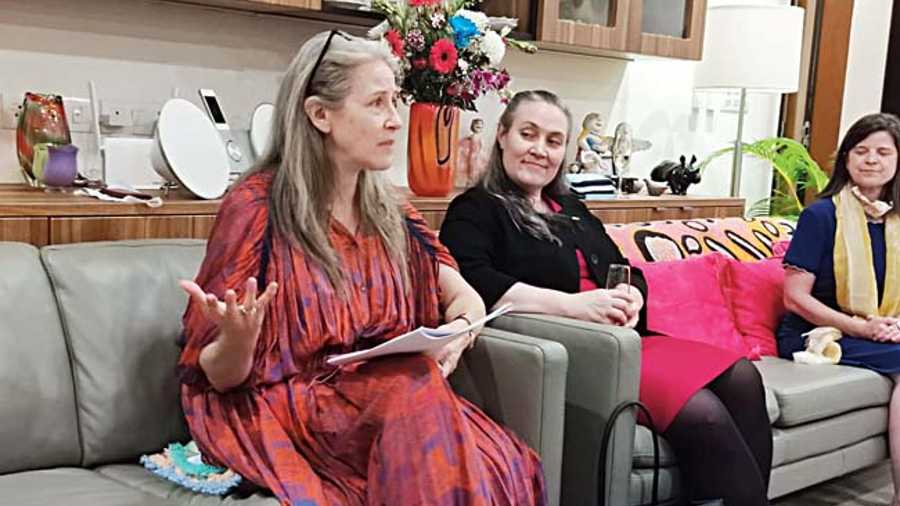A discussion on women in diplomacy got the two women heads of consulates in the city — the consuls general of Australia and the US, Rowan Ainsworth and Melinda Pavek respectively — together ahead of Women’s Day. Listening to them, laughing and empathising with them and later sharing their own stories and observations with them were local women leaders from various walks of life.
Ainsworth, the Australian consul general who hosted the meet at her residence, spoke of the inequities she had noticed in the political systems of the countries she was posted in. In one, despite decades of communism, women were not allowed to become heads of mission till recently. “In fact, I met the first one during my time,” she said.
In another very liberal European country, women got the right to vote as recently as 1945. “By 1908, all Australian women could vote. So I found 1945 rather shocking,” she exclaimed. And it was not till 1965 that women got permission to hold jobs there without the husband’s consent.
Ainsworth was quick to look inward as well. “In Australia, it has not been a completely level playing field either. Till 1966, women in public service had to resign when they got married,” she said. Inequities existed in other fields too. She quoted a 2015 report in The Guardian that said that in the top 200 stock exchange-listed companies in Australia there were more male CEOs named Peter than there were women.
She referred to a programme initiated within the ministry called “Women in leadership”. “The idea is to have a workplace which maximises perfomance and capability, allowing all genders to thrive equally.” This has led to the concept of a flexible work place, which allows coming in at different hours and doing part-time work. “Women are left behind because of gaps in their career due to child-bearing. How do they make that up? I think men should be able to take and, in fact, be forced into paternity leave. They should be able to enjoy parenthood as well,” she argued.
Hurdles and highs
The two senior diplomats also spoke of the challenges and cherished moments in their journey.
In the world of diplomacy, sometimes a young smiling face helps to wriggle out of a tight corner. Pavek recalled being sent years ago to deliver a message that the government of the country she was posted in was not going to like. “The official got so upset! He kept slamming on the table, yelling ‘No, you are backing out of your commitment.’ I stayed calm and polite, kept smiling and saying: ‘No sir, we aren’t. It will just take a bit more time’. A little bit inside me died but I kept telling myself ‘I can do this’. We drank a lot of tea and finally the gentleman relented.”
One of the best memories of her career, she said, was being a part of the team that helped inventory the contents of (former Iraq president) Saddam Hussain’s vault to return it to the government of Iraq. “When we had moved into Iraq, our military had gathered the valuable items (in Hussain’s palace) to be stored in a safe place. Ten of us from the embassy and 10 people from the government of Iraq spent eight hours counting everything, from jewellery to watches!”
It helped to be a woman diplomat in a Muslim country, she pointed out. When one is working, one is gender neutral but when one is socialising, one is treated as a woman and given access to more than one’s male colleagues. “In Lahore, I had conversations with the men for business but I also got invited to their homes and met their wives and daughters. That’s why we have more female diplomats in Muslim countries where the strict gender hierarchy does not apply to us and we get more insights.”
She spoke of other novel experiences too. While the US embassy in Iraq was housed for some time in Hussain’s palace, elsewhere she experienced palace intrigue — which part of the Sultan’s family was on the rise and which was not!
In a man’s world
Members of the audience identified with their experience of often being the only woman in a meeting which led to a deliberation on how a woman would conduct herself in such situations.
Ainsworth said she had an issue with American business executive and philanthropist Sheryl Sandberg’s “lean in” strategy that asks women to be more assertive at work and lean into positions of power. “I think one should be appreciative of who you are even if you are shy, deliberative and quiet,” she said.
Ainsworth referred to a study she had read that looked at male and female cognitive development differences by giving a task to babies of both genders which was essentially impossible to do, like putting a round peg in a square hole. The study observed that the girls got frustrated and gave up quickly while the boys tried harder and gave their all to the task.
“What that taught me was not that there are cognitive differences between boys and girls, which there might or might not be, but that there were evaluative fallacies in the study. The girls easily saw that it was a futile task and decided to get on with something else while the boys kept banging their heads against the wall. So there are different ways to look at merit,” she argued, as the audience applauded and laughed.
The evening ended with a showcase and tasting of six kinds of Australian wine.
